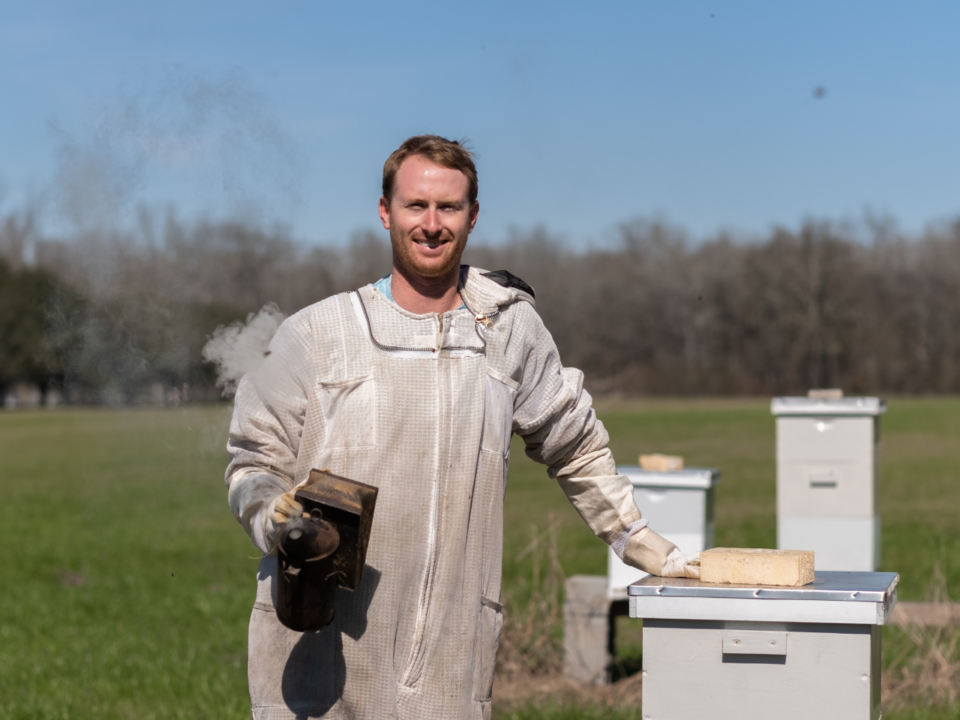For Luke Wagner, the owner of Bindi’s Bees Apiary, the development of his apiary began as a mild interest and grew into a unique hobby and business venture.
Wagner is known for giving elaborate presents. One fateful day roughly five years ago, he was mulling over the perfect Christmas gift for his father. As he and his wife were driving home from a vacation in San Antonio, his wife suggested giving him beekeeping gear since his father is an avid gardener. After doing some intensive research about bees and beekeeping, Wagner found the hobby more and more interesting and decided to order hive sets for both himself and his father.
In another stroke of inspiration, he drew up a plan to catch the bees for each hive using swarm traps meant to catch wild bees searching for a new place to nest. He ended up catching his first two or three hives with these traps in the first year of beekeeping.
After a successful year of caring for the bees, it was time to figure out what to do with the honey. When starting a business, one of the most important things is a fun and interesting name, and as any deserving pooch would have it, Bindi’s Bees is actually named after his Australian Cattle Dog, Bindi. While Bindi isn’t too fond of the bees, as she has been stung a few times, she dutifully follows Wagner outside to complete bee-related chores from a safe distance.
Bindi isn’t the only one who gets dragged into helping. As luck would have it, Wagner’s birthday falls during peak harvest season, which makes it the perfect excuse to get friends and family to help with the heavy lifting in the harvest process. Since he uses the largest boxes available for bees called “deep boxes,” which weigh eighty pounds each when full of honey, extracting honey takes an entire day. The extensive process often employs volunteers for an entire weekend of work, making it a real labor of love, but not without a tasty reward.
“It’s a lot of work, but it’s fun. Everyone has a sweet tooth that day,” quips Wagner. “There’s a lot of sampling going on.”
More often than not, it’s his brother who helps in the springtime to help with splitting, where hives are broken down into several different colonies to create more queen bees and therefore more hives. On the other hand, their father handles painting the bee boxes and the wax rendering, which involves using beeswax from uncapped honeycombs.
Like with any hobby, beekeeping is a mixed bag of highs and lows. What surprised him the most is how expensive it is to keep bees, but that isn’t the only surprise.
“Last year, I had a hive swarm on me, and it was a big hive. I went back a few weeks later to check where the queen was, since when a hive swarms, a new queen hatches and goes on a mating flight. If she doesn’t come back, the hive is queenless and will die. When I checked, the hive was queenless. So, I got eggs and some bees from multiple other hives and ended up making seven beehives out of this one hive,” shares Wagner.
After the crisis was over, six out of the seven hives survived thanks to the creation of six new queens. Wagner finds crises like this to be very rewarding since beekeepers can often manipulate situations to favor the bees instead of harm them. Unfortunately, there aren’t always creative fixes to every problem that arises. He finds that the most difficult part of caring for bees is when a hive dies. An invasive species from South Africa called hive beetles is a formidable problem for beekeepers, especially in south Louisiana. Once the beetles invade a dead or dying hive, they begin eating everything from the dead bees to the combs, causing the honey to ferment and stink.
Despite the work and the hardships, Wagner has learned and grown with his bees. Bindi’s Bees Apiary is rolling on strong as an all-natural apiary, meaning no chemicals are used to treat the bees or antibiotics to keep the bees healthier. His bees are not fed artificial feed like sugar water, so you can always expect to receive natural honey from hardworking bees.
“We do everything as God created it,” attests Wagner. “We aren’t manipulating the bees’ health or how they survive. Our main focus is to be an all-natural operation that doesn’t put anything in the hives that wouldn’t appear naturally.”
If you would like to keep up with Wagner and his happy bees, visit Bindi’s Bees Apiary’s Facebook page at facebook.com/Lwagne7 or by searching Bindi’s Bees Apiary.





